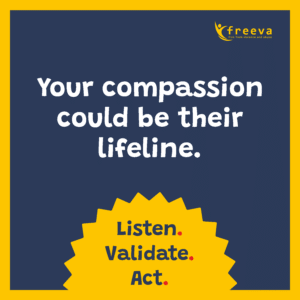Around 1 in 5 children have been exposed to domestic violence; this statistic is scary and highlights just how important it is that teachers know how to respond effectively if a student reports witnessing abuse at home.
We are on a mission to work with local schools to equip all staff with the necessary tools and knowledge to have these difficult conversations with pupils, and handle disclosures in a way that prioritises the child’s wellbeing above all else.
We recognise that when a child discloses domestic violence, it can be overwhelming, and may leave you with numerous questions: “What do I say?”, “Is this child in immediate danger?”, “Who do I tell?”, “Where do I report this?”, “Where can this child receive support?” The list goes on.
The good news is that your role is likely simpler than you might think. This blog will guide you through the entire process, so by the end, you’ll feel prepared to handle these difficult conversations appropriately.

Navigating Disclosures: Our 3-Step Rule
We have created a simple 3-step rule for you to remember when a child discloses witnessing domestic violence: Listen, validate, act. Let’s break these down.
Listen:
Once a child has come to you with a disclosure it’s crucial to listen patiently.
This child may be scared or worried about sharing this information, so they should not feel rushed or like a burden on your time. Give them the space to process what they are experiencing and articulate their thoughts at their own pace.
Avoid using leading questions, which imply their own answers and may prompt the child to respond in a particular way, potentially causing inaccuracies in their disclosure. Instead, use open-ended questions such as: “Tell me more about what happened,” “How did it happen?” “And then what happened?” “How do you feel about it?” and “How often has it happened?” These questions allow the child to provide information they are comfortable sharing, without steering their answers in any specific direction.
A good method to remember for this is the ‘TED’ Discussion method: Tell, Explain, Describe.
1. Tell me what happened
2. Explain what you were doing
3. Describe to me how that made you feel
Your questions should only be asked to help clarify whether the child is at risk of harm – this is our top priority. It is also important that you remain neutral in your reactions and facial expressions, appearing shocked or worried could exacerbate the child’s feelings and make the situation more distressing for them. We want to keep the child calm and reassure them that they are safe.
Validate:
The next step is to reassure the child that they have done the right thing in telling you.
It is important that they feel supported and safe throughout the entire process. The child may feel worried about the consequences of telling someone about their experiences, so it is vital to let them know that speaking up was the best decision. Make sure the child knows that the abuse is not their fault and has nothing do with their actions or behaviour.
Reassure the child that you are taking the matter seriously and that you will help from here. However, it is really important that you do not promise the child confidentiality. If they ask you not to tell anyone, explain that you will need to inform others, but it is only to help and protect them, and no one will harm them because of this.
Promising confidentiality and then breaking it could make the child feel betrayed, possibly leading them to retract their statement and become too scared to seek further help.
‘Be Heard, Be Brave, Be A Hero’; make sure the child knows that by telling a trusted adult about their experiences, they have been a hero. Emphasise that they have fulfilled their ‘superhero duties’. Their role is complete, and they don’t need to take any further action. Assure the child that you will handle the rest, and they don’t need to get involved any further.
Act:
It is crucial to take action promptly after a disclosure.
Follow your school’s protocol, whether it involves talking to parents, contacting the police, or reaching out to social services. Additionally, make notes of the disclosure as soon as possible. You are more likely to record accurate and detailed information while the event is still fresh in your mind.
For further support, please reach out to Freeva; our trained professionals can provide additional guidance.
If you feel that your team could benefit from further support around handling disclosures and creating a safe space for your students, we offer expert in-school training. For more information on this, please email [email protected].

Our latest Be Heard, Be Brave, Be A Hero campaign is here to help schools become equipped with all the materials you should need to encourage pupils to come forward about their experiences of domestic violence at home.
To book in for a Freeva assembly and receive a campaign print pack and lesson plan, email [email protected].
With your help, we can ensure more children get the support they deserve after witnessing abuse at home. Your compassion could be their lifeline, so it is vital to learn how to have these conversations correctly.






